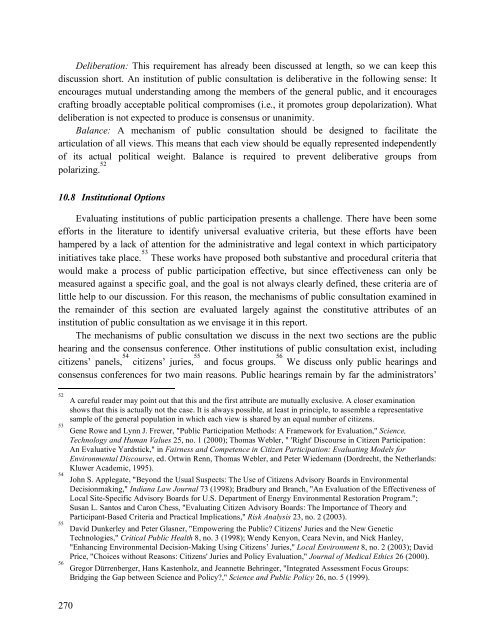Final Report (all chapters)
Final Report (all chapters)
Final Report (all chapters)
You also want an ePaper? Increase the reach of your titles
YUMPU automatically turns print PDFs into web optimized ePapers that Google loves.
Deliberation: This requirement has already been discussed at length, so we can keep this<br />
discussion short. An institution of public consultation is deliberative in the following sense: It<br />
encourages mutual understanding among the members of the general public, and it encourages<br />
crafting broadly acceptable political compromises (i.e., it promotes group depolarization). What<br />
deliberation is not expected to produce is consensus or unanimity.<br />
Balance: A mechanism of public consultation should be designed to facilitate the<br />
articulation of <strong>all</strong> views. This means that each view should be equ<strong>all</strong>y represented independently<br />
of its actual political weight. Balance is required to prevent deliberative groups from<br />
polarizing. 52<br />
10.8 Institutional Options<br />
Evaluating institutions of public participation presents a ch<strong>all</strong>enge. There have been some<br />
efforts in the literature to identify universal evaluative criteria, but these efforts have been<br />
hampered by a lack of attention for the administrative and legal context in which participatory<br />
initiatives take place. 53 These works have proposed both substantive and procedural criteria that<br />
would make a process of public participation effective, but since effectiveness can only be<br />
measured against a specific goal, and the goal is not always clearly defined, these criteria are of<br />
little help to our discussion. For this reason, the mechanisms of public consultation examined in<br />
the remainder of this section are evaluated largely against the constitutive attributes of an<br />
institution of public consultation as we envisage it in this report.<br />
The mechanisms of public consultation we discuss in the next two sections are the public<br />
hearing and the consensus conference. Other institutions of public consultation exist, including<br />
citizens’ panels, 54 citizens’ juries, 55 and focus groups. 56 We discuss only public hearings and<br />
consensus conferences for two main reasons. Public hearings remain by far the administrators’<br />
52<br />
53<br />
54<br />
55<br />
56<br />
A careful reader may point out that this and the first attribute are mutu<strong>all</strong>y exclusive. A closer examination<br />
shows that this is actu<strong>all</strong>y not the case. It is always possible, at least in principle, to assemble a representative<br />
sample of the general population in which each view is shared by an equal number of citizens.<br />
Gene Rowe and Lynn J. Frewer, "Public Participation Methods: A Framework for Evaluation," Science,<br />
Technology and Human Values 25, no. 1 (2000); Thomas Webler, " 'Right' Discourse in Citizen Participation:<br />
An Evaluative Yardstick," in Fairness and Competence in Citizen Participation: Evaluating Models for<br />
Environmental Discourse, ed. Ortwin Renn, Thomas Webler, and Peter Wiedemann (Dordrecht, the Netherlands:<br />
Kluwer Academic, 1995).<br />
John S. Applegate, "Beyond the Usual Suspects: The Use of Citizens Advisory Boards in Environmental<br />
Decisionmaking," Indiana Law Journal 73 (1998); Bradbury and Branch, "An Evaluation of the Effectiveness of<br />
Local Site-Specific Advisory Boards for U.S. Department of Energy Environmental Restoration Program.";<br />
Susan L. Santos and Caron Chess, "Evaluating Citizen Advisory Boards: The Importance of Theory and<br />
Participant-Based Criteria and Practical Implications," Risk Analysis 23, no. 2 (2003).<br />
David Dunkerley and Peter Glasner, "Empowering the Public? Citizens' Juries and the New Genetic<br />
Technologies," Critical Public Health 8, no. 3 (1998); Wendy Kenyon, Ceara Nevin, and Nick Hanley,<br />
"Enhancing Environmental Decision-Making Using Citizens’ Juries," Local Environment 8, no. 2 (2003); David<br />
Price, "Choices without Reasons: Citizens' Juries and Policy Evaluation," Journal of Medical Ethics 26 (2000).<br />
Gregor Dürrenberger, Hans Kastenholz, and Jeannette Behringer, "Integrated Assessment Focus Groups:<br />
Bridging the Gap between Science and Policy?," Science and Public Policy 26, no. 5 (1999).<br />
270


